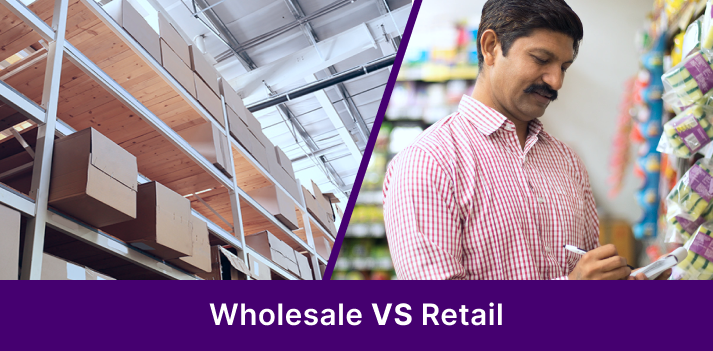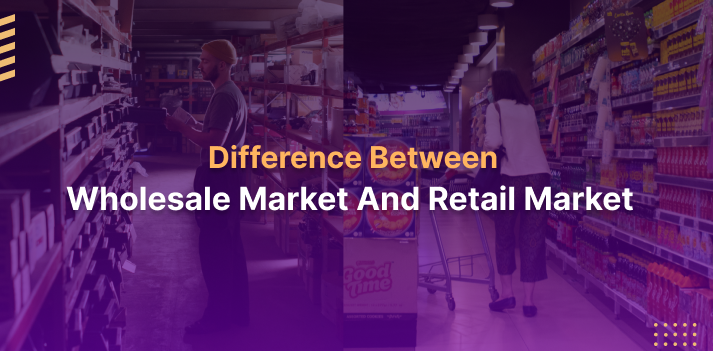Have you ever questioned whether the grocery store close to your home from which you buy daily items is a wholesale or retail establishment? If you understand the concept behind wholesalers and retailers, it is simple to distinguish the distinctions between them. You’ll understand the distinction between wholesalers and retailers after reading this article.
Were you aware?
India’s annual retail sales are estimated to be 35,94,465 crore rupees, with small family-owned businesses controlling close to 90% of the market. Wholesale refers to the sale of products in large quantities. The majority of the supply chain consists of retail and wholesale distribution arrangements.
After producing goods in an industry, the products are sold in bulk (wholesale) to wholesalers, who then sell them to retailers, who sell them to consumers. While a wholesaler sells products to businesses, the businesses themselves purchase products to resell. In contrast, a retailer sells products directly to the final consumer.
In this strategy, these two organisations serve as vital marketing channel intermediaries. If these two links are present, the chain will stay balanced.
What Do You Know About wholesaler?

“wholesale” refers to clients, including businesses and merchants, with discounted products in bulk. It is a type of business in which the wholesaler purchases items in bulk from the manufacturer and divides the majority into smaller quantities. They are subsequently repackaged and made available for sale to other parties.
Wholesalers pay little attention to the shop’s location, appearance, and product presentation because they sell to retailers and other businesses that resell their products. Therefore, they have no interest in these matters whatsoever.
In the wholesale market, the emphasis is placed on the number of items rather than their quality. In addition, the company’s size requires substantial capital investment to launch a wholesale operation. Therefore, publicity and advertising are not necessary.
However, a wholesale company’s customers are located in numerous cities, towns, and states. Most products are sold on credit to wholesale buyers, and the price of items purchased at wholesale is lower because the profit margin is smaller.
What Exactly is the Term Retailer?
Small-lot retail refers to the sale of merchandise in small quantities. The retailer serves as the intermediary between wholesalers and consumers, purchasing products in bulk from wholesalers and selling them to the end consumer.
Comparatively expensive are retail purchases. The primary cause is the high-profit margin associated with advertising costs. In addition, they proportionally include other costs in the price of the goods, such as rent for the space, employee salaries, etc.
Due to intense competition, it may be difficult to retain customers for an extended period of time; therefore, the store must understand how to interact with customers. Location, appearance, merchandise, quality of merchandise, and customer service carry significant weight. The retail businessperson always selects high-quality products, choosing the best and rejecting the flawed or subpar ones.
Difference Between Wholesale and Retail Trade

- The marketing of relatively large quantities of items is referred to as wholesale trade, whereas the marketing of relatively small quantities of items is referred to as retail trade.
- High turnover characterises the wholesaler. Alternatively, the turnover rate of a retailer is relatively low.
- A wholesaler purchases goods from manufacturers or producers, whereas a retailer typically acquires merchandise from wholesalers.
- Wholesalers’ clients are retailers who purchase goods at low prices, whereas retailers sell products directly to market customers.
- The wholesaler operates on a large scale because he buys and sells in relatively large volumes. On the other hand, the retailer’s operations are on a small scale because he buys and sells a small number of products.
Difference Between Wholesale and Distribution
- A wholesaler is a person or organisation that purchases goods in large quantities and resells them in smaller quantities. On the other hand, the distributor is a crucial link in the chain that supplies goods and services to the entire market.
- Distributors typically enter agreements with manufacturers to distribute non-competitive goods or product lines. In contrast, a wholesaler does not enter into a contract with the manufacturer and is, therefore, free to offer the store products from various competing producers.
- The service area of a distributor is greater than that of a wholesaler, whose service area is more limited.
- There are four distribution levels, and wholesalers are typically located at the second and third tiers. Alternatively, the distributor is the only participant in the three-tier distribution system.
- Wholesalers are open to selling products to potential customers or retailers; instead, they wait for the retailer to express interest and order a product. In contrast, the distributor negotiates a contract with the producer and participates in promotional efforts to increase sales. Consequently, they serve as the producer’s sales representative.
Difference Between Wholesale Market And Retail Market
- The wholesale market sells goods to retailers, while the retail market sells products directly to consumers.
- The wholesale market provides the greatest quantity of specific goods, whereas the retail market carries only small quantities.
- In the wholesale market, a single dealer deals with a single product type, while in the retail market, a single retailer may deal with multiple products.
Conclusion
When a product is manufactured, it never goes directly to the consumer; instead, it travels through multiple distribution channels before reaching the retail store owner. In the wholesale market, competition exists, but retaining and acquiring customers is difficult. After reading this article, it will be simple for you to distinguish between wholesalers and retailers.
Follow Zyro for the most recent updates, news blogs, and articles concerning micro, small, and medium-sized enterprises (MSMEs), business advice, income tax, GST, salary, and accounting.




Recent Comments